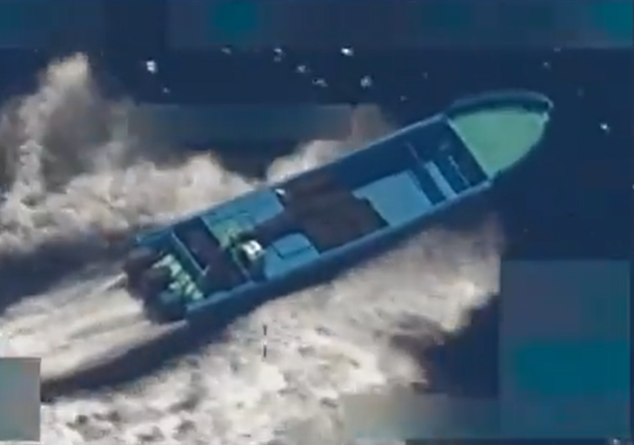The U.S. has struck two alleged drug vessels on the Pacific side of Latin America over the last two days, killing five people, Secretary of Defense Pete Hegseth confirmed Wednesday.
The Trump administration has now carried out nine known strikes against alleged narcotics trafficking boats since last month, leading to at least 37 deaths. The first seven strikes were within the Caribbean Sea — but this week, the strategy broadened to the East Pacific.
The first strike took place on Tuesday, with two people killed. A defense official confirmed the vessel was in international waters off of Colombia. A second strike took place on Wednesday, according to Hegseth, killing three more.
In a pair of nearly identical X posts announcing the strikes Wednesday, Hegseth said the boats were operated by a “Designated Terrorist Organization” and were “transiting along a known narco-trafficking route” in international waters. He said they were “known by our intelligence to be involved in illicit narcotics smuggling.” He did not specify the organization that allegedly operated the boats.
Hegseth said no U.S. forces were harmed in the strikes.
He also shared videos of the strikes, both of which show vessels moving in the water before they are seemingly hit and engulfed in flames. In the video from Wednesday’s strike, bags or parcels appear to be floating in the water after the boat was struck.
Democratic Sen. Mark Kelly of Arizona said Sunday on “Face the Nation with Margaret Brennan,” “We want to keep fentanyl out of the United States, … but those routes through the Caribbean on boats are predominantly used to bring cocaine to Europe,” not to the U.S. And fentanyl tends to be transported to to the U.S. “from a different way,” Kelly added.
The Pentagon has not yet responded to a request for information about the nationalities of the individuals on the boat that was struck Tuesday.
Kelly also told “Face the Nation” that when administration officials briefed Congress on the drug vessel strikes, they “had a very hard time explaining to us the rationale, the legal rationale for doing this and the constitutionality of doing it.” He said lawmakers were told there is “a secret list of over 20 narco organizations, drug trafficking cartels,” but U.S. officials did not share the list with Congress.
The Trump administration has told Congress the U.S. is in a “non-international armed conflict” with drug cartels, arguing that the narcotics they smuggle kill tens of thousands of Americans every year, and this constitutes an “armed attack.”
Two men survived a U.S. strike on a suspected drug-trafficking submersible vessel in the Caribbean last week, and the U.S. repatriated the men, one from Ecuador and one from Colombia. Ecuador released the man, identified as Andrés Fernando Tufiño, after authorities said they had found no evidence that he had committed a crime.
The Colombian citizen remains hospitalized after his repatriation. Interior Minister Armando Benedetti said he “arrived with brain trauma, sedated, drugged, breathing with a ventilator.” Authorities there said he would face prosecution. Two other men were killed in the strike on the submersible vessel.
Meanwhile, the Dominican Republic granted permission to the U.S. military to use its airports for staging operations in support of counternarcotics flights, according to two American officials who spoke to CBS News on Wednesday under conditions of anonymity because they were not authorized to speak publicly about ongoing military operations.
The U.S. and the Dominican Republic have worked together on countering drug trafficking and other forms of transnational organized crime going back to the mid-1980s.
Government shutdown enters Day 22 as Trump gives Democrats ultimatum
Potential shooting plot at Atlanta airport thwarted, police say
Plans underway for Border Patrol crackdown in San Francisco area, U.S. officials say

